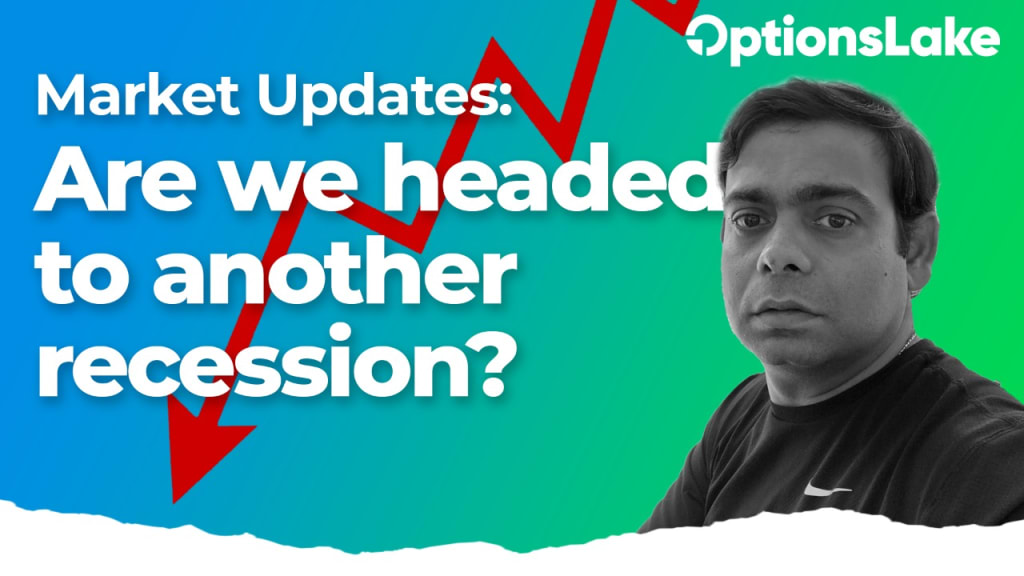
Under the weight of high inflation and rising interest rates, the US economy is beginning to show indications of strain, boosting the likelihood of a crisis. The market sell-off, especially the stock market, has accelerated in the past few weeks. Technically we have already entered a bear market with S&P trading below 20% from its all time high . A brief comparison of the current market trend with the previous mega bear market trends of 2000-2001 and 2007-2008 will throw light on the ongoing situation. Although the US economy is now doing well, there is a chance of a recession developing.
As a result of rising fuel and food prices, American households are spending a big part of their savings to help them get by. Homebuilders are becoming more pessimistic about the future as mortgage rates rise. Small businesses are also grappling with growing operating expenses and challenges finding and keeping employees.
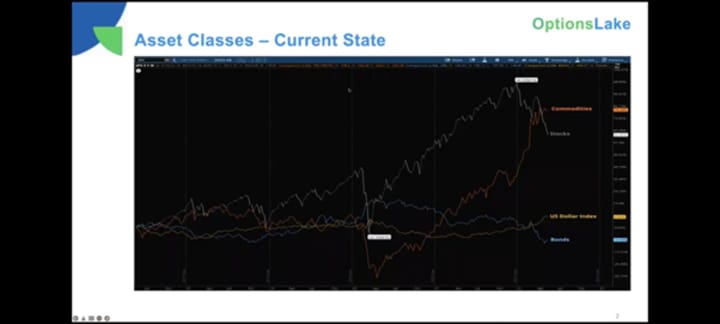
If we look at the present state of asset classes, commodity prices have risen significantly over the past two months. US dollar has spiked, and there has been a steep sell-off in the bond market as well, which is an area of concern.
Earlier this month, Deutsche Bank made headlines when it became the first major financial institution to predict a US recession, although perhaps a "mild" one. It is now predicting a deeper decline as a result of the Federal Reserve's efforts to reduce persistently high inflation.
The moot question is, "Is the US headed for a recession?"
Major forces at play in today's time
• Inflation
• Rise in mortgage/ interest rates
• Strengthening of the US dollar against all major world currencies.
A hike in interest rates is the most likely cause of a recession right now. Inflationary pressures are anticipated to persist shortly. Another daunting cause of concern is the hike in gas prices.
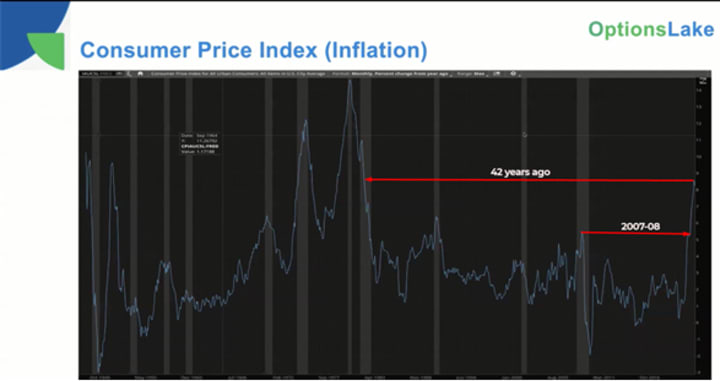
The market sell-off, i.e., the stock market, has indeed accelerated in the past few weeks. Commodity (natural gas, oil, metals, grains, etc.) prices have gained an unprecedented surge in the past month, which is indicative of inflation. As seen in the above image, such inflation has not been witnessed in the past 42 years. On comparing the present-day inflation to that of 2007-08, (refer above image) and 2000-01, it can be seen that both the markets were fairly low, which is the root cause of concern.
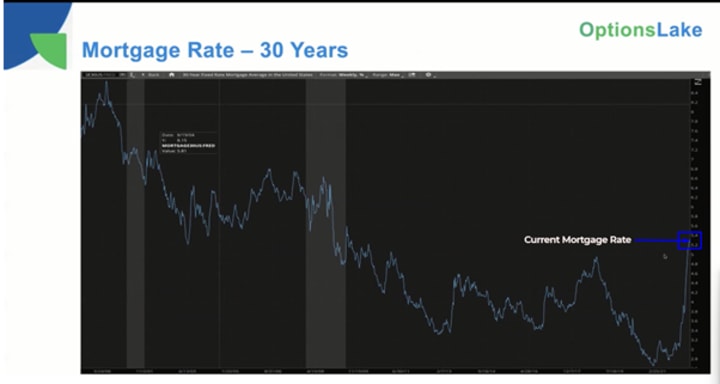
The home prices have reached new highs and home sales have started to decline due to rising mortgage rates. There has been a new burst in the US dollar strength. Economic conditions, government policies, import-export imbalances, and other variables all influence its value. The dollar’s appreciation implies it is becoming more valuable than other currencies, which can directly impact your wallet. If the dollar gets any more strengthened, it’ll start resembling the 2000-01 cycle.
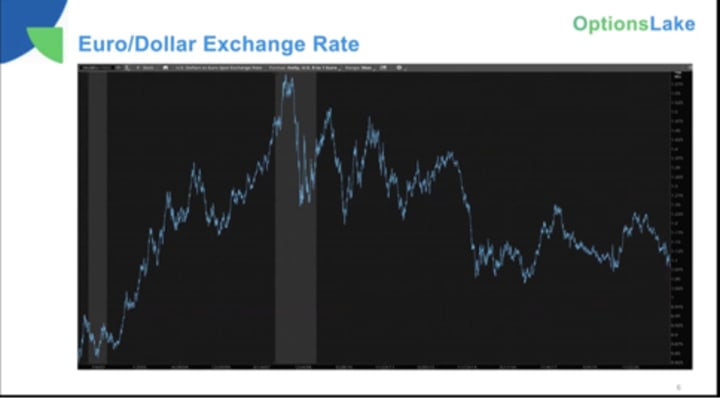
From these major forces, it is crystal clear that the inflation rates are worrisome, the mortgage rate is fairly in the middle, and the dollar is concerningly high. Now you must be wondering what was the common theme of both these bear markets?
Well, it was sadly the recession. If you analyze the CPI data chart, it can be seen that before the deadly depression, inflation was at an all-time high. There was a steep sell-off over a span of seven years, back in 2000. Even during the 2007 dip, the pattern repeated itself, and it took almost five years to gain the usual normalcy. If we take a closer look at today’s situation, there are strong indications of a recession, as prior to the recession, inflation is always on the rise.
Factors leading to Recession
● Inflation
● Resulting in the Fed
⮚ Raising interest rates
⮚ Stopping buying or starting selling of securities such as treasury bills
● Leading to
⮚ Reduced liquidity in the market
⮚ Induced demand destruction
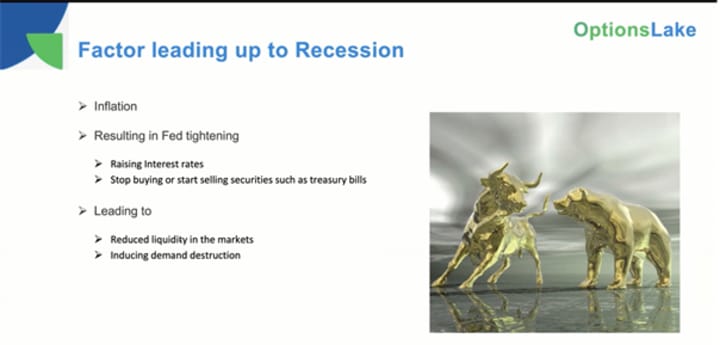
Impact on the Stock Market
Currently, the stock market is in a turbulent sell-off mode, resulting in:
⮚ Valuation crush
⮚ Earnings crush
This results in a massive correction in stock prices. If you’re wondering, what is the stock price, well, it is the Price/ Earnings Ratio * Earnings per share
Comparison 2000-01, 2007-08, 2021-22
As we are presently thinking about investing or trading, the current cycle trend must be taken into consideration.
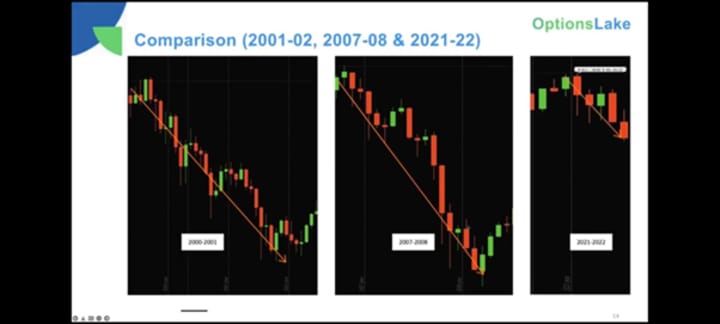
When was the first major warning sign?
It all started on 20th January 2022 when the Advance-Decline cumulative average of all stocks traded on NYSE went below the trend line, marking the start of a market sell-off.
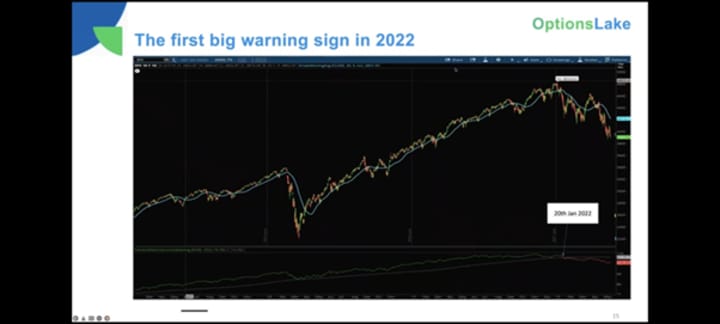
There has been a sell-off in the small-cap and the mid-cap segments and off-late the mega-caps have also started to sell-off in a big way.
What's next?
⮚ Are we heading for a recession like in 2000-01 & 2007-08?
⮚ Would Fed be able to provide a soft landing?
⮚ Would US consumers continue to stay strong?
⮚ Would the US labor market continue to be strong?
All eyes are on the FED. We are in a changing paradigm as we witness both valuation and earnings contraction for most stocks. The market trend has changed significantly and is not about "Buying the Dip". One must not buy stocks when mega institutional investors/ hedge funds are actively dumping. Options equip one with the additional flexibility of trading on both bullish and bearish and having the ability to configure risk/ reward depending upon the "Market Technicals".
Only time can tell whether we are steadily treading into a state of recession. But, keeping the previous trends in mind, the situation seems a bit scary as the build-up is more or less similar when we stack up the macro and economic indicators.






Comments
There are no comments for this story
Be the first to respond and start the conversation.